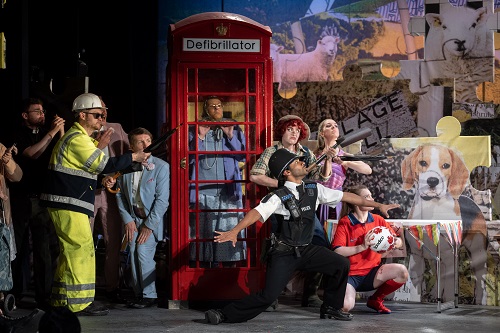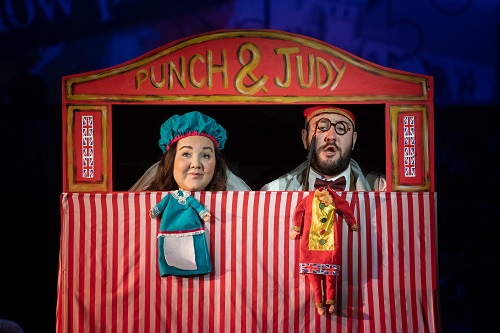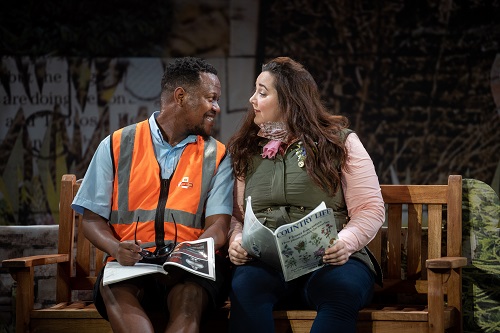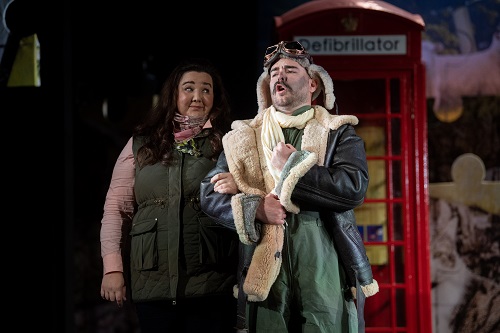After John Doyle’s spartan Werther at Grange Park Opera, in which the locale was essentially a symbolic representation of the lovelorn protagonist’s mind, at Longborough Festival Opera for their production of Donizetti’s L’elisir d’amore director Max Hoehn and designer Jemima Robinson have created a countryside village – not so dissimilar from those found in the surrounding Gloucestershire valleys – of which one can only say: ‘All human life is here!’ And, given the opera’s happy outcome, I think the Holy Ghost is probably there, too.
Robinson’s crowded set is a multicoloured jigsaw puzzle – literally – of post boxes, partridges, puppies and park benches, set against snatches of green fields, stone walls and sheep. This countryside is ‘Green, pleasant and now protected’, a slogan tells us. The village folk are a motley, more-or-less modern, band: a postie (Nemorino), a bobby-on-the-beat, a dog-collared vicar, a farmhand with spade, a kohl-eyed Goth, builders in high viz and hard hats. The young women are sporty: one hops about with a football, another does keep-fit, while a schoolgirl in kilt and blazer (Giannetta) whizzes about on a scooter. Two elderly ladies run the charity bookstall. For some reason, everyone swaps hats in Act 2.

There’s not an awful lot of room on the congested stage, but Hoehn still manages to pack in neat routines and gags – physical, verbal and visual – involving traffic cones, trolley-bags and animals. During the overture, two pastel-suited dandies share a perfect picnic. A squirrel on a stick trumpets Belcore’s arrival. The villagers hide their prying eyes behind copies of Country Life as Nemorino woos Adina, while she and Dulcamara sing their Barcarolle from a Punch and Judy hut. Nemorino goes cross-eyed as he slurps his elixir through a glittery loveheart-straw.
As the action spins along, it feels a bit hyperactive at times. There’s a red telephone box turned defibrillator station stage-right and, given the pace of the capers, one worries if it might prove to be needed. And, amid such business it’s hard for the cast to establish their characters as more than caricatures and ciphers. There are some strange switches of tone, too, as when, at the end of Act 1, the ensemble viciously thrust large lollipop-images of Adina at the tormented Nemorino. There certainly is some ‘darkness’ in the score, but it needs a bit of preparation on stage.

But, if some of the humanity of Donizetti’s opera missing, the characters do win our affection. Thando Mjandana over-sang a little at the start of the first-night performance (something that, in fact, all the cast were guilty of at times), but the tenor settled into his groove and was a charmingly genuine Nemorino – the goofiness sparing, the good-heartedness ever-present. His ‘Una furtive lagrima’ was elegant and controlled, one of the few moments during the evening where the emotions had time to run deeper.

As Adina, Jennifer Whitton’s keen-edged soprano glinted and she negotiated all the vocal flounces with accuracy and brightness but it sometimes felt as if she needed a bit more space on stage to really capture Adina’s brio. She may be a wealthy landowner’s daughter, but her ugly Act 1 costume doesn’t help. ‘Prendi, per me sei libero’ was focused and touching, though, with well-considered light and shade.
This Dulcamara is a bit of a bruiser, arms tattooed and sporting a thick leather apron that would not be out of place in an abattoir. Bass-baritone Emyr Wyn Jones can only just about squeeze his Elixir pop-up shop onto the village’s main street but, authoritative of manner and imposing of tone, he proved a deft salesman in ‘Udite, udite, o rustici’. The villagers, too, proved more adept at using his credit card-reader than one prime minister we know, as they rushed to flash the plastic and gulp down his elixir.

Arthur Bruce’s Belcore is in the Air Force rather than the army, a veritable Biggles – aviator furs, googles and all – who crashes into the village and into Adina’s heart. Puffed up and pompous, later he dons a Superman costume under his khaki pilot flight suit and obsesses over an Action Man model. Bruce’s baritone is a bit blustery at times, but there’s plenty of punch and it fits the characterisation. Haegee Lee doesn’t really have an much opportunity to do much with Giannetta, stuck as she is on that scooter, but she sings stylishly enough.
From the pit, Alice Farnham drives the action forwards and takes the Longborough Festival Orchestra through their paces. They play vividly and classily.
At the close of the opera, Dulcamara takes advantage of Nemorino’s good fortune – his uncle’s dead, he’s inherited a fortune, and all the girls, including Adina, want to marry him – to extol the power of his elixir, which has palpably worked its magic. The credit cards are flashed once more. Unlike his gullible guzzlers, Longborough audiences won’t go home feeling fleeced after watching Hoehn’s sunny show.
Claire Seymour
Nemorino – Thando Mjandana, Adina – Jennifer Witton, Belcore – Arthur Bruce, Dulcamara – Emyr Wyn Jones, Haegee Lee – Giannetta, Director – Max Hoehn, Conductor – Alice Farnham, Designer – Jemima Robinson, Lighting Designer – Mark Jonathan, Longborough Festival Chorus and Orchestra.
Longborough, Gloucestershire; Tuesday 20th June 2023.
ABOVE: L’elisir d’amore at Longborough (c) Matthew Williams-Ellis